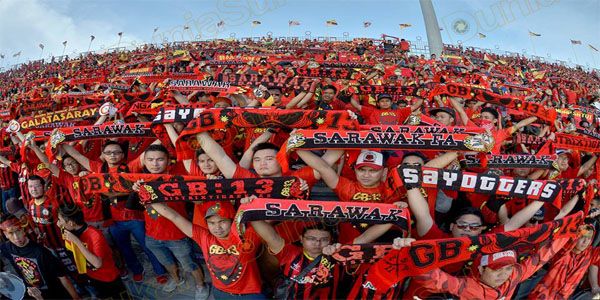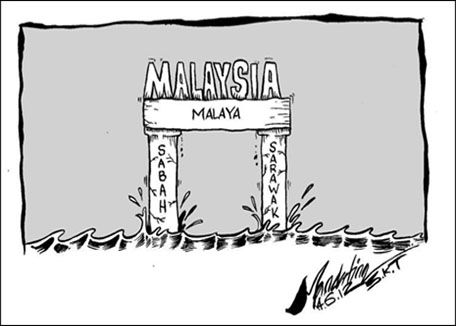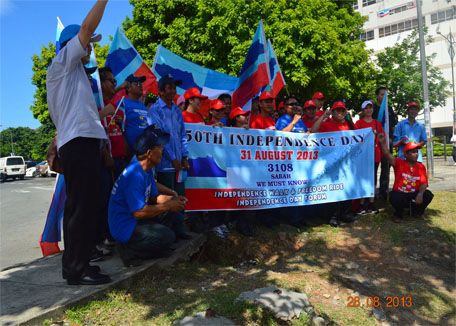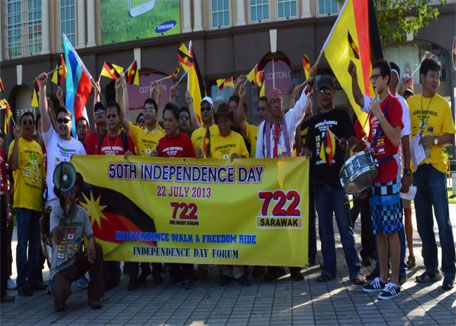P/S: Jangan gelak arr kalau nampak bendera apa tu.
Vote for STAR!
Only STAR Party can protect and bring back the Truly concept of Independence and Sovereign Country!
Sarawak for Sarawakian!
The Spirit of Sarawak for Sarawakian is getting stronger everyday!
Is this Sabah and Sarawak fate?
Sabah and Sarawak were promised to have a Self-Government. But what happen after 50 years forming The Federation of Malaysia?
Sabah 50th Independence Day
Sabah or formerly known as North Borneo was granted an Independence by British on 31 August 1963
Sarawak 50th Independence Day
Sarawak was granted Independence by British on 22 July 1963
Thursday, 19 December 2013
STAR: Lawatan ke kawasan bencana banjir - DATUK DR. JEFFREY KITINGAN
P/S: Jangan gelak arr kalau nampak bendera apa tu.
STAR: Lagu Rasmi Parti STAR berjudul "Bintang Borneo"
Facebook Page: STAR, Sarawak
Facebook Page: STAR N38 JEMORENG
Facebook Group: STAR N38 JEMORENG
Facebook Page: STAR P207 IGAN
By, Rajah Raqafluz
UNITED BORNEO FRONT: UBF AKAN TERUS BERGERAK MEMBERI ILMU KEPADA RAKYAT - DATUK DR. JEFFREY KITINGAN
Datuk Dr. Jeffrey Kitingan is the Chairman of STAR Sabah and State Assemblymen for N33, Bingkor, Sabah.
He also contested in P180, Keningau garnering 11900 strong votes
|
Facebook Page: STAR, Sarawak
Facebook Page: STAR N38 JEMORENG
Facebook Group: STAR N38 JEMORENG
Facebook Page: STAR P207 IGAN
By, Rajah Raqafluz
UNITED BORNEO FRONT: UBF to continue efforts to enlighten the people - DATUK DR. JEFFREY KITINGAN
Datuk Dr. Jeffrey Kitingan is the Chairman of STAR Sabah and State Assemblymen for N33, Bingkor, Sabah.
He also contested in P180, Keningau garnering 11900 strong votes
|
Facebook Page: STAR, Sarawak
Facebook Page: STAR N38 JEMORENG
Facebook Group: STAR N38 JEMORENG
Facebook Page: STAR P207 IGAN
By, Rajah Raqafluz
Cancer drugs free of charge - RAJAH RAQAFLUZ
 |
| Rajah Raqafluz (Pen name) is the admin for "STAR TODAY". Believe in STAR Sarawak and United Borneo Front (UBF), advocate of Borneo Agenda, Friends of the Trust and a firm follower of Harunyahya. |
Facebook Page: STAR, Sarawak
Facebook Page: STAR N38 JEMORENG
Facebook Group: STAR N38 JEMORENG
Facebook Page: STAR P207 IGAN
By, Rajah Raqafluz
Say no to sacrificing ties on the altar of politics - RAJAH RAQAFLUZ
Rajah Raqafluz (Pen name) is the admin for "STAR TODAY". Believe in STAR Sarawak and United Borneo Front (UBF), advocate of Borneo Agenda, Friends of the Trust and a firm follower of Harunyahya.
|
 |
| Tun Fuad Stephens (Sabah 1st Chief Minister) and Stephen Kalong Ningkan (Sarawak 1st Chief Minister) |
Facebook Page: STAR, Sarawak
Facebook Page: STAR N38 JEMORENG
Facebook Group: STAR N38 JEMORENG
Facebook Page: STAR P207 IGAN
By, Rajah Raqafluz
Monday, 16 December 2013
STAR: “New Comprehensive Plan Needed to Tackle Poverty" - DATUK DR. JEFFREY KITINGAN
Datuk Dr. Jeffrey Kitingan is the Chairman of STAR Sabah and State Assemblymen for N33, Bingkor, Sabah.
He also contested in P180, Keningau garnering 11900 strong votes
|
It’s extraordinarily high compared to the national average of 9% and more than double that of the next highest Kelantan at 15% with Selangor performing the best with 2%” said Datuk Dr. Jeffrey Kitingan, STAR Sabah Chief in response to the United Nations Children Fund (UNICEF) Report “Profile of Children in Malaysia”
Facebook Page: STAR, Sarawak
Facebook Page: STAR N38 JEMORENG
Facebook Group: STAR N38 JEMORENG
Facebook Page: STAR P207 IGAN
By, Rajah Raqafluz
Sunday, 15 December 2013
STAR SABAH: Build Monorail Not Tram - DATUK DR. JEFFREY KITINGAN
Datuk Dr. Jeffrey Kitingan is the Chairman of STAR Sabah and State Assemblymen for N33, Bingkor, Sabah.
He also contested in P180, Keningau garnering 11900 strong votes
|
Facebook Page: STAR, Sarawak
Facebook Page: STAR N38 JEMORENG
Facebook Group: STAR N38 JEMORENG
Facebook Page: STAR P207 IGAN
By, Rajah Raqafluz
Saturday, 14 December 2013
Newly register political parties: Rebuilding Sarawak-based opposition front
There has not been much movement from Parti Ekonomi Rakyat Sarawak Bersatu (PERSB), Parti Bumi Kenyalang, Parti Bansa Dayak Sarawak Baru (PBDS Baru), People’s Alliance for Justice of Peace (Peace Party) and Parti Tenaga Rakyat Sarawak (Teras) in the last three months.
With the current political landscape, I don’t see these new parties getting the support from people of Sarawakian, either in the rural areas or urban areas.
Political analyst, Dr Jeniri Amir said that:
“Basically, these parties need support from rural voters because in the urban areas there is no way the Chinese or the middle class will support these mosquito parties.
“There is no light at the end of the tunnel for these five new parties,” he stated.
The analyst noted that Sarawak’s political landscape was heading towards a two- party system but the emergence of these five new parties was not really good for the scenario.
While the increase in political players is good for democracy, it splits and diluted the support for opposition parties, Jeniri added.
Rajah Raqafluz political analysis:
However, because of the political landscape was heading towards a two-party system where the other parties of opposition are Malaya-based parties (PR), it was an actually ingenious move and covert operation for Sarawakian politician landscape.
These scenarios actually opening up a new political landscape where these new parties in the future will make an allegiance either to become BN-friendly parties, PR-friendly parties or UBF-friendly parties. And the last alternatives, standing alone by their own.
The good thing about these new parties registrations is that the formation of opposition parties in Sarawak will increase as well which will become a rival for Malaya-based parties such as PKR, PAS and DAP. These new parties will strengthen the opposition voice of Sarawakian itself by rejecting the Malaya-based opposition parties either they're in the government front or opposition front.
These healthy environments where opposition voices will also consist of Sarawakians instead of Malaya proxies of PKR, PAS and DAP as being dictate currently in the political landscape, is good especially in the long run for the protection of Sarawak sovereignty from foreign power and puppet masters such as Malaya.
This is a hard lesson from Sarawak counter-part in Sabah, where politician have become merely a puppets led by Umno from Malaya-based parties.
This situation, where Malaya-based parties (PR) become dominant will not blend well with the Sarawakian especially for the long run of political progress in this biggest country of Sarawak in the Malaysia federation.
After all, all politicians, political analyst, scholars and Sarawakian alike should always remember that Malaysia is a federation of Sarawak, Sabah and Malaya.
Sarawak sovereignty must be protected on all fronts, at whatever cost it should be. And this time, opposition front should be protected from Malaya-based parties of PKR, PAS and DAP.
Sarawak for Sarawakians. Vote for Sarawak-based parties only.
Facebook Page: STAR, Sarawak
Facebook Page: STAR N38 JEMORENG
Facebook Group: STAR N38 JEMORENG
Facebook Page: STAR P207 IGAN
By, Rajah Raqafluz
Friday, 13 December 2013
Kennedy School Graduate Held Prisoner - DATUK DR. JEFFREY KITINGAN
Datuk Dr. Jeffrey Kitingan is the Chairman of STAR Sabah and State Assemblymen for N33, Bingkor, Sabah.
He also contested in P180, Keningau garnering 11900 strong votes
|






























